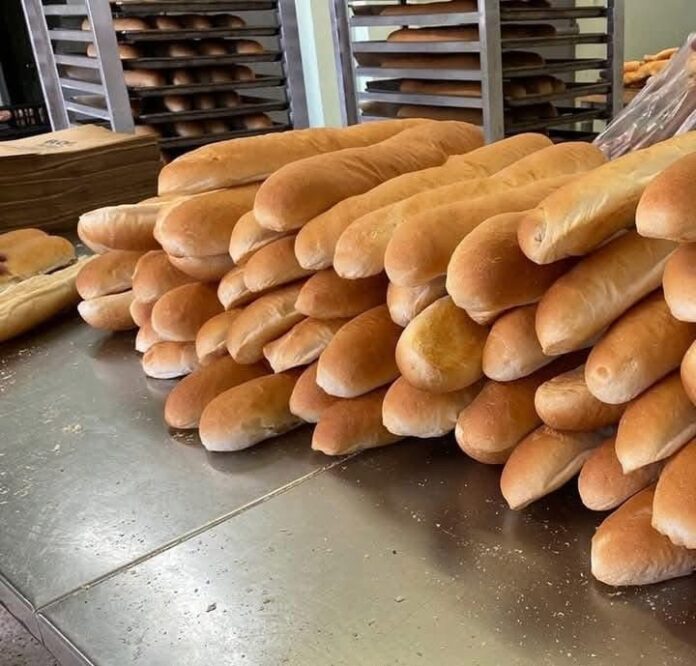By Ebrima Mbaye
The proposed increase in bread prices from D10 to D13, which had raised concerns among consumers in The Gambia, has been temporarily suspended. Following consultations with relevant stakeholders, the National Baker’s Union of The Gambia announced that bread will remain priced at D10 until further notice.
The initial plan to raise prices was linked to the rising costs of flour and other essential baking ingredients. The decision to pause the increase has prompted questions about the reasons behind this change and the potential duration of the price freeze.
Shopkeepers and bakers, who play a crucial role in bread distribution, have voiced their concerns regarding the price hike. Muhammed Bah, a shopkeeper in Mandinaring, highlighted the pressures they face due to the rising cost of flour, which affects overall pricing.
“The price of flour keeps increasing, which means bakers have to charge more for bread. At the same time, customers are struggling and complaining about high prices. If bread goes up to D13, it will be even harder for us to sell,” Bah stated.
Bakers have also expressed their challenges. Sulayman Barry, a baker from Lamin Kerewan who supplies bread to both Lamin and Mandinaring, indicated that the proposed price adjustment was necessary for the sustainability of their businesses.
According to our Correspondent, many wonder how long this price freeze will last and what the future holds for bread pricing in The Gambia.
Sulayman Barry, a baker from Lamin Kerewan, emphasized the challenges bakers face: “The cost of flour, yeast, and even firewood has gone up significantly. If we sell at the same price, we will lose. We are not trying to make bread unaffordable; we are just trying to stay in business,” he explained.
The proposed price increase has raised concerns among ordinary citizens, particularly low-income families. Fatou Jawneh, a mother from Farato, expressed her worries about how a price increase would affect her household budget.
“Bread is a basic necessity, and we buy it every day. If it goes up to D13, how will we manage? This is going to affect a lot of families, not just mine. Everything is expensive already,” she said.
Residents from Busumbala, including Alhagie Sonko and Tida Ceesay, echoed similar frustrations. “Every day, prices of basic goods are going up. First, it was rice and oil, and now they want to increase bread. How are ordinary Gambians supposed to survive?” Sonko questioned.
The National Baker’s Union initially defended the price increase, citing the high costs of essential baking materials. However, after discussions with government officials and other stakeholders, the Union opted to suspend the price hike for the time being.
In a recent interview on GRTS, representatives of the National Baker’s Union of The Gambia recognized the financial challenges facing both bakers and consumers. They confirmed that despite the high cost of flour and other baking materials, the Union has decided to keep the price of bread at D10. This decision will remain in effect while discussions with relevant authorities are scheduled for Monday to explore long-term solutions.
The Union also emphasized its engagement with the government to find ways to stabilize the prices of flour and other essential baking ingredients.
While the temporary suspension of the price hike has offered some relief, uncertainty persists among the Gambian populace regarding the future of bread prices. Bakers may feel compelled to seek another price increase if flour prices continue to climb.
Meanwhile, the Ministry of Trade, Industry, Regional Integration, and Employment also announced late Sunday evening that the planned increase in the price of a loaf of bread from D10 to D13, as proposed by The Gambia Bakers’ Union, has been put on hold. This follows recent engagements between the Ministry and the Union regarding the proposed price change, which was set to take effect on Monday, February 17, 2025.
Both parties have agreed to further discussions with the government to explore the issue comprehensively and seek a potential resolution.
The Ministry emphasizes its commitment to working closely with the National Baker’s Union to ensure a fair outcome that considers both producers’ and consumers’ interests.
Historically, significant adjustments to bread prices in The Gambia have occurred at intervals. The last price change took place in 2019 when the cost of a loaf rose from D8 to D10. Prior adjustments were made in 2014 when prices increased from D6 to D8, and in 2007 when prices went from D2.50 to D3.00.
Presently, bread remains priced at D10, but the duration of this stability is uncertain. This question looms for both consumers and businesses as they await further developments.





